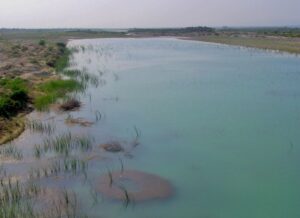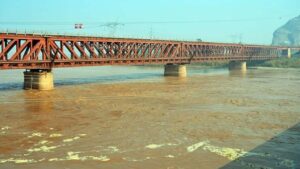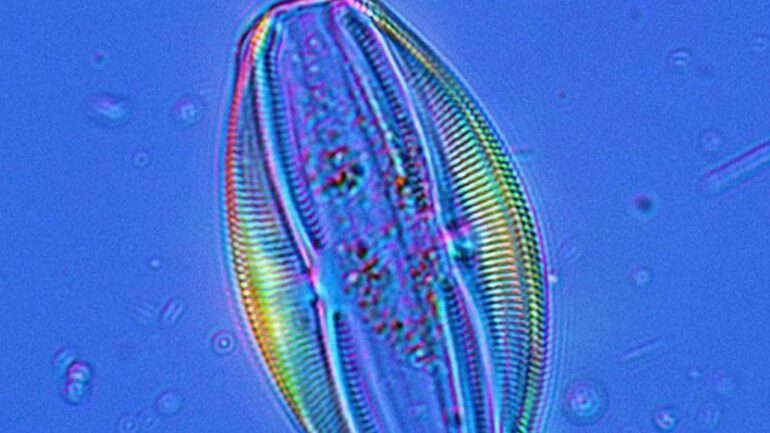Islamabad : In our previous articles, we delved into the fascinating world of diatoms and their profound impact on shaping our planet’s ecosystem. Today, we embark on the final part of our article series, where we unveil the economic significance of Rhizosolenia’s bioremediation projects in Pakistan. As an environmental services company, Rhizosolia’s mission is not only to clean and revitalize rivers but also to create positive developmental impacts in the regions where they operate. In this article, we will explore how their pilot scale facilities, situated in the remote upstream locations of Balochistan and Punjab, will be generating job opportunities, uplifting local economies, and fostering sustainable growth. Join us as we discover the transformative power of bioremediation and its profound influence on economic fortunes.
These projects by Rhizosolenia , driven by the remarkable capabilities of diatoms, go beyond the mere eradication of pollutants. By efficiently eliminating micro pollutants like nitrogen, phosphorus, and silica from the water, their bioremediation efforts result in a significant improvement in water quality. This enhanced water quality not only benefits the fish population, ensuring a healthier ecosystem, but also holds immense promise for agriculture and domestic use. Clean waters mean higher agricultural yields, leading to increased food production and economic growth in rural communities. Moreover, access to clean water for domestic use positively impacts the health and well-being of the local population.
One of the defining aspects of Rhizosolenia’s projects is their presence in remote upstream rural areas. These areas often face limited employment opportunities, leaving the local communities struggling to find sustainable livelihoods. By strategically building pilot scale facilities in these regions, they aim to bridge this employment gap and create valuable job opportunities for the residents. Through their projects, they generate employment in various sectors, including the cultivation and maintenance of microalgae, installation of physical nets, and monitoring of water quality. This localized approach ensures that economic benefits are directed to the very areas where they are most needed. Income per person in Pakistan averaged 872.33 USD from 1960 until 2022 and it tends to be much lower in rural areas. Through these projects they are trying to direct impact on uplifting the economic fortunes of these communities.
In line with the commitment to fostering a healthier ecosystem, Rhizosolenia is also planning to install trash interceptors in rivers. These interceptors will serve as a barrier, effectively collecting physical trash and preventing it from further polluting the water and endangering aquatic life. Removing physical debris will contribute to the creation of a cleaner and safer habitat for fish and other aquatic organisms. A restored and healthier ecosystem also has far-reaching impacts on human lives. It enhances water quality for domestic use, ensuring that communities have access to safe and clean water for their daily needs.
Furthermore, the revitalization of rivers through bioremediation projects holds the potential to positively impact the economy of both rural areas and the broader nation. As the rivers regain their natural splendor and become thriving ecosystems once again, they attract tourism and recreational activities. This increase in tourism brings with it numerous economic opportunities, such as the establishment of accommodations, dining, and local businesses. Rural areas, in particular, benefit from this influx of visitors, as it stimulates economic growth, creates employment, and promotes local products and services. The overall boost to the tourism sector translates into a positive impact on the economy of both rural areas and Pakistan as a whole.
Today, we will provide a comprehensive overview of the initiatives undertaken by Rhizosolenia to tackle Pakistan’s climate requirements. We shall delve into the underlying necessity and examine the advantages that these endeavors will bring.
Let us delve into the topic and explore it in greater detail.
-River Kech Project:
Balochistan, also spelled Balūchistān, the home of Kech river bioremediation project, is the western most province of Pakistan. It is bordered by Iran (west), by Afghanistan (northwest), by Khyber Pakhtunkhwa and Punjab provinces (northeast and east), by Sindh province (southeast), and by the Arabian Sea (south).
In Balochistan, the fishing industry holds immense importance as a major source of income for coastal communities. The contribution of the fisheries from Balochistan is almost 34% of the total production of fisheries in Pakistan. However, the rivers in the region, including the Kech River, have been severely affected by pollution, jeopardizing the fish populations and the livelihoods of fishermen and their families. This has had a profound impact on the cultural and economic fabric of the region, where fishing traditions have deep roots.

Unlike other parts of Pakistan where rivers fed by glaciers exist, Balochistan relies heavily on underground water sources for drinking and agricultural purposes. Unfortunately, the once clean and safe water sources have been transformed into polluted water bodies. Both surface and groundwater in Balochistan are contaminated with coliforms, toxic metals, and pesticides, posing serious health risks to the communities.
By enhancing water quality in the rivers of Balochistan, the project directly supports the fishing industry and the livelihoods of coastal communities. A thriving fish population not only ensures economic stability but also upholds the cultural significance of fishing traditions that have been integral to the region for generations. Additionally, the project holds the potential to provide clean water for agriculture and foster sustainable development in Balochistan.
The positive impacts of the river Kech project extend beyond environmental restoration. By creating local employment opportunities, particularly in remote upstream rural areas, the project contributes to the economic well-being of the communities that need it the most. The income generated from these employment opportunities helps alleviate poverty levels, strengthen local economies, and improve the overall quality of life for the people of Balochistan.
Through the River Kech project, Rhizosolenia aims to restore the ecological balance of the Kech river, revitalizing the fishing industry, and providing clean water resources to support agriculture and domestic needs. By addressing the pollution issues and promoting sustainable practices, the project embodies a comprehensive approach to environmental conservation and socioeconomic development. As the project progresses, it is expected to not only transform the local ecosystem but also pave the way for a more prosperous and sustainable future for the communities of Balochistan.
Chenab River Project:
The Chenab River, located in the central-eastern region of Pakistan, runs through Punjab, which is home to over half the country’s population. The province’s economy is primarily agricultural, with a significant contribution from the industrial sector. However, the health of the Chenab River and its ecosystem have been deteriorating due to pollution and other challenges. To address this pressing issue, Rhizosolenia has embarked on the transformative Chenab River Bioremediation Project.
The Chenab River Bioremediation Project aims to restore the river’s health and ecosystem by employing innovative bio-based technologies and harnessing the power of microalgae. The project recognizes the critical role that the river plays in Punjab’s agricultural production and overall economy. Punjab contributes around 68% to the annual food grain production in Pakistan, highlighting the importance of maintaining a clean and thriving river system.

In rural areas of Punjab, where poverty levels are significantly higher than in urban areas, agriculture is the main livelihood for the majority of the population. However, rural poverty can only be alleviated if the economy generates opportunities for investment, entrepreneurship, job creation, and sustainable livelihoods. By implementing the Chenab River Bioremediation Project, Rhizosolenia is not only tackling environmental pollution but also creating local employment opportunities in remote rural areas. This helps to enhance the economic well-being of rural communities and contributes to sustainable development.
The fisheries department in Punjab has been actively involved in preserving certain fish species and maintaining a balanced aquatic ecosystem. However, a report presented by the department in the Punjab Assembly highlighted the endangerment of seven fish species, including Malhi, Khaga, Pari, Palu, and Sanghara. The scarcity of water and increasing pollution pose significant threats to the natural fish population in Punjab’s rivers. Untreated sewage water and the discharge of toxic chemicals from industrial waste have severely contaminated the rivers, turning them into polluted water bodies. Floating plastic objects further obstruct sunlight from entering the water, endangering aquatic life.
Water contamination in Punjab is a major concern, with microbiological factors and arsenic rendering the water unfit for use and a significant health risk. Cotton farms in the province have been found to contribute to groundwater contamination due to the excessive use of pesticides. Improper disposal of industrial waste has also played a role in polluting the rivers through the direct or improper discharge of toxins and chemicals.
Additionally, the poor water sanitation system and inadequate drainage lines result in the drainage of coliform bacteria into water bodies such as rivers and lakes. This contributes to waterborne diseases, causing a high number of diarrheal cases and deaths in Pakistan. Diarrhea accounts for 60% of deaths among infants and children in the country. Addressing water pollution and improving water quality in the Chenab River through the bioremediation project will have a direct positive impact on public health.
Also, as a part of the Chenab River Project, Rhizosolenia plans to install physical nets in the river to collect physical trash and debris. This proactive approach to addressing pollution will not only restore the ecological balance of the river but also contribute to the overall cleanliness and sustainability of the region. Moreover, by creating employment opportunities for the rural population, particularly in areas where job opportunities are scarce, the project aims to support sustainable livelihoods and contribute to the economic development of Punjab and Pakistan as a whole.
Through the Chenab River Bioremediation Project, Rhizosolenia is committed to restoring the health of the river, providing clean waters for agriculture, domestic use, and preserving the biodiversity of the region. By tackling pollution, capturing carbon, and promoting sustainable practices, the project aligns with broader sustainability goals, contributing to global efforts in mitigating pollution and combating climate change. Ultimately, the project seeks to create a cleaner and healthier environment for present and future generations, while fostering economic prosperity and sustainable livelihoods for the rural communities of Punjab.
In conclusion, Rhizosolenia’s bioremediation projects in Pakistan will play a crucial role in addressing pollution and revitalizing the health of these rivers. Through the use of native diatoms and innovative bio-based technologies, Rhizosolenia is planning to make a positive impact on the environment and local economies.
By focusing on cleaning rivers and restoring water quality, Rhizosolenia’s projects have significant implications for various industries and livelihoods. The fishing industry, which serves as a major source of income for coastal communities, has been adversely affected by pollution in rivers. According to WWF officials, approximately 90% of the fish consumed in the country is contaminated, putrefied, and unfit for human consumption. However, with the implementation of bioremediation techniques, cleaner waters can support healthier fish populations, ensuring the sustainability of this vital industry.
Moreover, the projects’ presence in rural and remote areas of Punjab and Balochistan has created local employment opportunities contributing to the sustainable livelihoods of rural populations. This not only improves economic prospects but also fosters a sense of ownership and responsibility towards the environment among the local communities.
Bioremediation, facilitated by the use of native diatoms, has proven to be an effective approach to restore the health of ecosystems. The ability of diatoms to eliminate micro pollutants and enhance the water quality, benefiting not only aquatic life but also agriculture and domestic water usage.
As Rhizosolenia continue their efforts to clean rivers, create sustainable job opportunities, and promote environmental stewardship, they are open for potential partners and collaborators to reach out to them.
Together, we can make a difference in preserving our natural resources and shaping a healthier future.
For inquiries, partnerships, and collaborations, please contact us at rhizosolenia.collaborate@gmail.com.
This article concludes our series. Thank you for joining us on this journey towards a cleaner and more sustainable future for the generations to come.



